One has only to look at the financials of a global infrastructure firm like Ferrovial to see how important — and how profitable — roads and bridges can be, especially with national funds that will near $2 trillion driving projects in the U.S. alone. Growth of the company’s toll roads and construction divisions drove the company’s Q1 2024 revenue to $2 billion and earnings to $276 million.
One of the strongest areas of performance? Express lanes in multiple places in Texas and in Virginia, two of the leading areas for corporate facility investment year after year in Site Selection’s various rankings. Growing employers and their teams demand better transportation connectivity, even as their numbers often grow too fast for thoroughfares to keep up and even as materials and construction labor shortages can lengthen timelines and ratchet up costs.
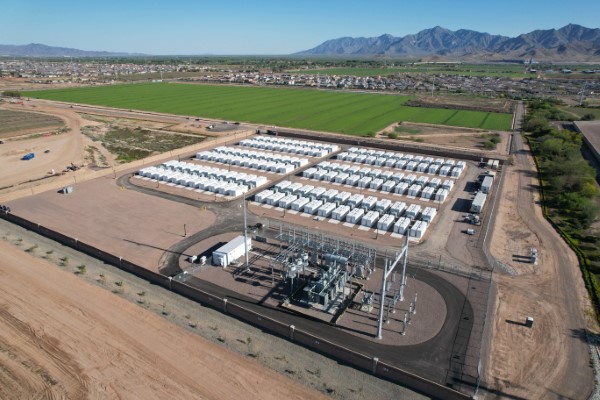
Skyrocketing corporate investment has blended with infrastructure projects such as Salt River Project’s Sierra Estrella battery storage site (above) and Valley Metro’s rail transit expansion (below) to create a fertile environment for growth in Greater Phoenix.
Photo courtesy of SRP and Valley Metro
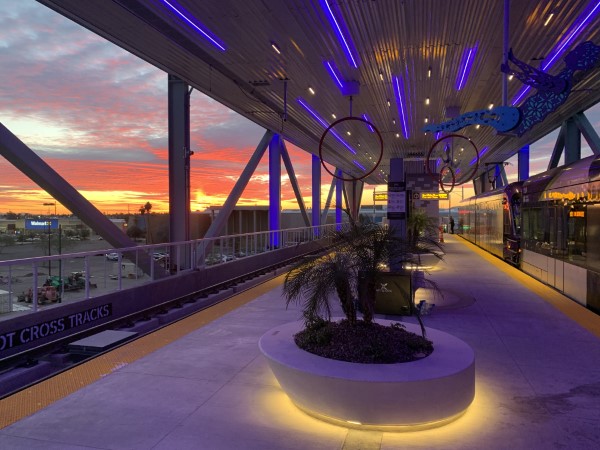
Photo courtesy of SRP and Valley Metro
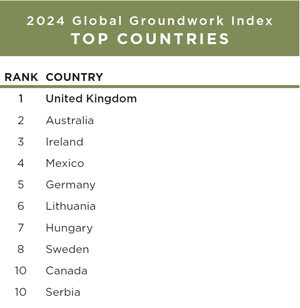
The intrinsic tie between employer-led economic development and public infrastructure is what drove Site Selection several years ago to create the Global Groundwork Index, a unique blend of project data from our own Conway Projects Database of corporate end-user facility investments (locations and expansions) and external data on public infrastructure project investment from the United States government’s database and from the OECD’s infrastructure database for OECD countries.
Taking in all the corporate data since 2020 (number of projects, capital investment and jobs) and the most current infrastructure funding data, Site Selection Director of Programming & Analytics Daniel Boyer crunches the numbers on a cumulative and per-capita basis to determine the Top 10 U.S. states, Top 10 U.S. metros and Top 10 Countries outside the United States.
This year, like last year, Ohio is No. 1 and Indiana is No. 2. But there’s a new arrival tied with Indiana, as Arizona shoots up from No. 10, fueled by an array of corporate investment driven in large part by the nation’s semiconductor and data center surge. (For more, see the Greater Phoenix Intelligence Report in this issue.) That same surge is driving much of Ohio’s economy too, most obviously in the activity surrounding Intel’s 1,000-acre fab site in Licking County near Columbus.
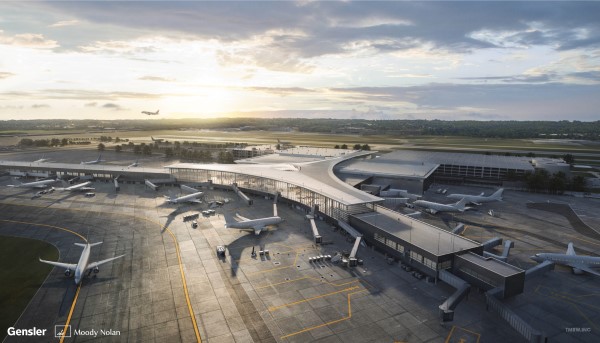
Ohio’s array of available and improving infrastructure includes Rickenbacker International Airport, a new terminal coming to John Glenn Columbus International Airport and the LinkUS transportation and growth plan (including bikeways and trails) created by the Central Ohio Transit Authority, the City of Columbus, the Franklin County Board of Commissioners, the Mid-Ohio Regional Planning Commission and the Columbus Partnership.
Photo courtesy of Columbus Regional Airport Authority and COTA
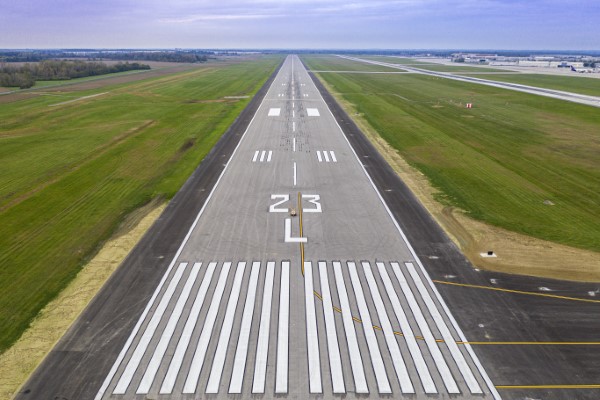
Rickenbacker International LCK Runway
Photo courtesy of Columbus Regional Airport Authority and COTA

Photo courtesy of Columbus Regional Airport Authority and COTA
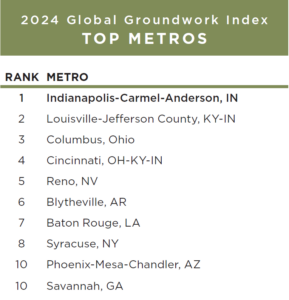
Methodology: Cumulative and per-capita calculations based on Conway Projects Database projects, project-affiliated job creation and project-affiliated capital expenditure, Jan. 2020 through July 1, 2024. Cumulative and per-capita calculations based on project and funding data from the Bipartisan Infrastructure Law (BIL) Maps Dashboard. Retrieved from https://d2d.gsa.gov/report/bipartisan-infrastructure-law-bil-maps-dashboard)
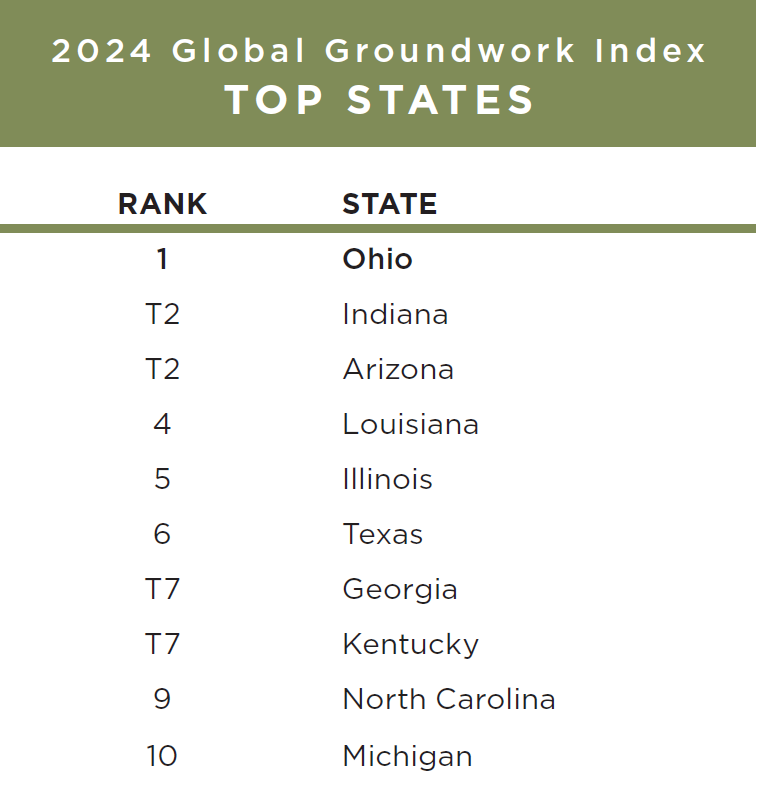
Methodology: Cumulative and per-capita calculations based on Conway Projects Database projects, project-affiliated job creation and project-affiliated capital expenditure, Jan. 2020 through July 1, 2024. Cumulative and per-capita calculations based on project and funding data from the Bipartisan Infrastructure Law (BIL) Maps Dashboard. Retrieved from https://d2d.gsa.gov/report/bipartisan-infrastructure-law-bil-maps-dashboard)
‘Takin’ My Time, Just Movin’ Along’
In fact, routes were custom designed to deliver prefabricated machinery weighing over 900,000 pounds and as long as an Ohio State football field from the Ohio River in Adams County to the Intel site.
“We worked very closely with the Ohio Department of Transportation [ODOT] and Governor DeWine’s office to look at different possible routes, and ultimately decided that using the Ohio River made the most sense,” says Kevin Hoggatt, Intel’s director of state government affairs for Ohio, in a JobsOhio video about the equipment’s journey posted in late August. In the next frame, Matt Bruning, ODOT’s press secretary, says, “Ohio is a state that makes and moves things, and certainly this is evidence of that.”
Key to getting to the “Silicon Heartland” of Ohio is AORTA: the Adams Ohio River Transit Access. It’s where one of the companies building the air separator unit offloaded the equipment after a journey up the Mississippi and Ohio rivers from New Orleans. Then it’s a carefully managed 150-mile trip from Manchester, Ohio, through West Portsmouth, Lucasville, Chillicothe, Rickenbacker, Pickerington and Pataskala before reaching the site near New Albany.
“ODOT’s role has been to analyze the route and make sure the infrastructure can handle a load this big,” says Bruning. “It’s been a lot of coordination with a lot of our local partners, making sure we can get through intersections and under lights and under bridges. It shows off the talents not only these haulers have, but the engineers and different folks at ODOT have to make sure this route can work.”
Intel and ODOT worked out the route over a full year, including putting some horizontal-armed traffic signals on swivels so they could pivot out of the way while still mounted on their poles as the Intel load crawled through. Some might assume the government would have to pay for that. They would be wrong.
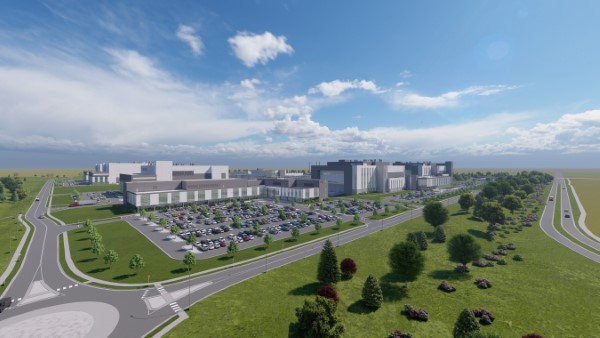
Eli Lilly and Company’s $9 billion project located in Indiana’s LEAP Research and Innovation District is creating 900 new direct jobs and 5,000 construction jobs.
Rendering courtesy of Eli Lilly and Company
“To have that piece of equipment and the generosity of Intel to buy it not just for their loads but for any future loads that might come through here for another company just shows the teamwork that goes into this,” Bruning says.
“This port provides an opportunity for not just us but for employers across Ohio, anyone with large items, to get them throughout the state,” says Hoggatt. “It’s access that is free and open,” adds Jack McCoy, owner of AORTA. “So if someone in our area wants to use this port, they’re hooked in globally.” Indeed, the route already has been used by a plastics recycler in Hebron, and other companies are evaluating its potential for their own growth.

The Ada Infrastructure Docklands Data Center, projected to be one of London’s largest data center campuses at 201 MW, will serve as both corporate investment and infrastructure — both digital connections and pathways along the Thames.
Rendering courtesy of Ada Infrastructure
Central Casting
Metro Indianapolis, Louisville and Columbus top this year’s metro areas, with Indy repeating last year’s No. 1 ranking, Louisville sliding into second place where Columbus resided last year and Columbus a quite robust No. 3, replacing Dallas-Fort Worth, which drops out of the Top 10 even as Texas ranks a solid No. 6 in the state rankings. The tri-state region of metro Cincinnati is No. 4.
Those familiar with the highways of the Midwest know the Louisville-Cincy-Columbus corridor well, connected by I-71. From that busy corridor it’s just a hop, skip and jump to Indianapolis along I-74, or take the straight route from Louisville to Indy on I-65.
A look at the artist’s rendering for Eli Lilly and Company’s recently doubled investment in Lebanon, Indiana, on the northwestern outskirts of the Indianapolis metro area along I-65, shows how important roads are to the project, which has now ballooned to a $9 billion commitment to expand capacity to manufacture active pharmaceutical ingredients (API) for Zepbound® (tirzepatide) injection and Mounjaro® (tirzepatide) injection products for adults with chronic diseases like obesity and type 2 diabetes.
To support Lilly’s expansion project, the state will partner on infrastructure solutions — road improvements, water, electric and other utilities — as well as workforce development commitments and certain economic incentives tied to the company’s achievement of investment and employment goals. The state’s workforce development support includes the contribution of land, pending approval, for the construction of a learning and training center that will be part of the larger LEAP industrial development.

Heathrow Airport in the UK welcomed an all-time record of 18.5 million passengers between January and March, upgraded its traffic projections for 2024 to a new record of 82.4 million passengers and then saw 8 million passengers travel through in July alone.
Photo courtesy of Heathrow Airports Limited
World View
The United Kingdom tops our country rankings, followed by Australia, Ireland, Mexico and Germany.
This summer, a new project arrived on the banks of the Thames in London that embodies corporate end-user investment and digital infrastructure all at once. Ada Infrastructure, the data center platform of GLP Capital Partners, was awarded a resolution to grant planning in June from the Newham Strategic Development Committee to deliver one of London’s largest data center campuses, the 210-MW Docklands data center campus.

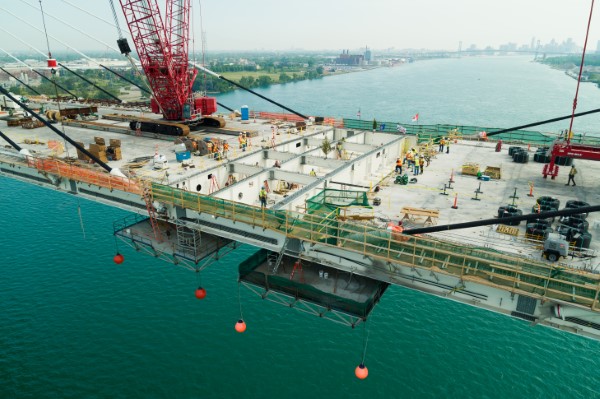
Ironworkers and operating engineers from Canadian and U.S. unions shook hands at the middle of the $6.4 billion Gordie Howe International Bridge (bottom image) in June as the last portion of the deck was completed to connect the span whose construction began in December 2022. The bridge is expected to open to vehicle, pedestrian and bicycle traffic in fall 2025.
Photo courtesy of Gordie Howe International Bridge
“In addition to collaborating with local partners to provide job training and employment opportunities,” said Jennifer Weitzel, president of Ada Infrastructure, “the project’s future-ready design, including energy-efficient systems, net positive landscaping, and strict physical and cybersecurity protocols, will set new standards for safe and sustainable development in the age of AI.”
Those plans include good old physical infrastructure too. The development features three 70-MW data center buildings and a community multi-purpose facility available to the community for job training programs “to enhance local opportunities and foster careers across the digital infrastructure and technology sectors,” Ada said, noting that public space improvements will include improved pathways for pedestrians and cyclists along the Thames River.

